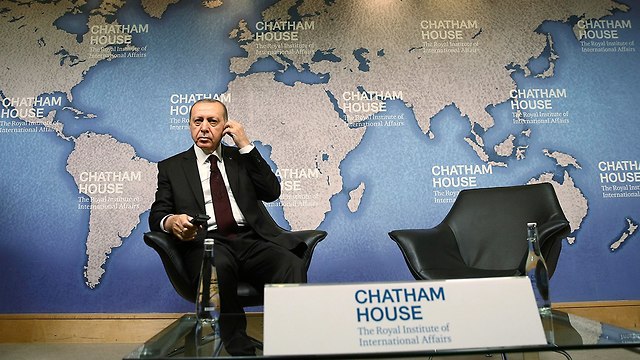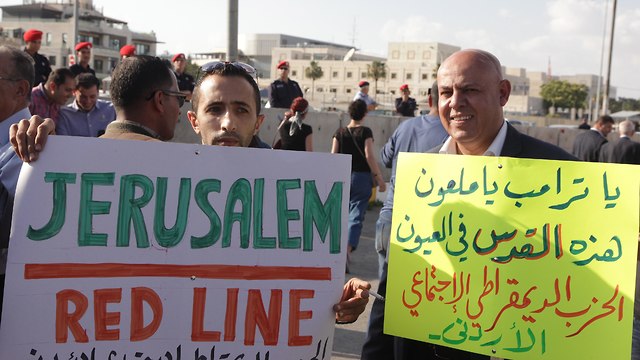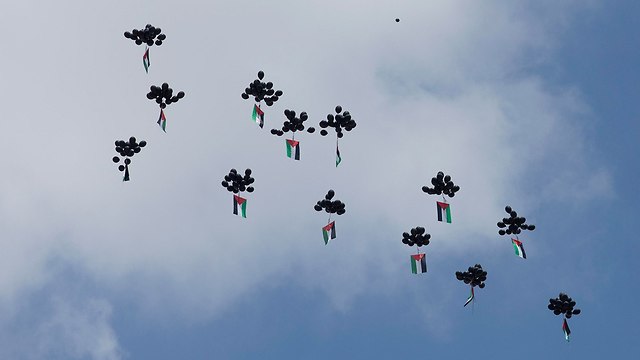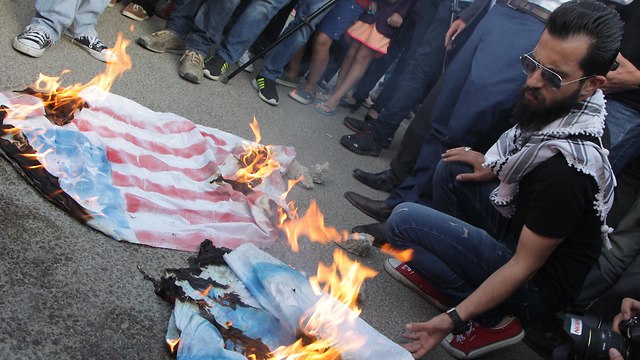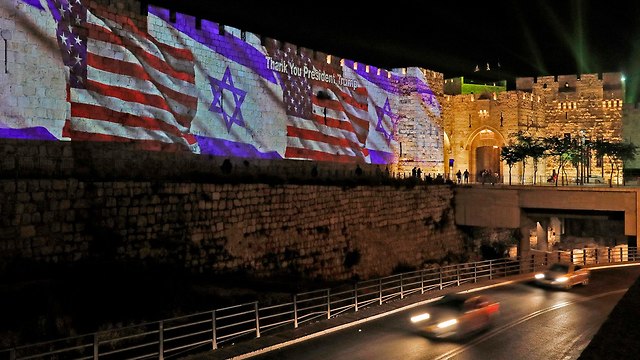

Erdogan: US Embassy makes Washington part of the problem
Arab, Muslim world fumes as US opens Jerusalem embassy while scores of Palestinians killed by IDF in Gaza border clashes; Protests rage outside US Embassy Jordan; Erdogan: 'US has lost mediator role'; Muted criticism from Gulf states fearing Iranian regional ambitions.
The opening of the US Embassy in Jerusalem on Monday, while IDF troops killed dozens of Palestinian protesters in Gaza, sparked outrage in much of the Middle East—but virtual silence among Washington's closest Gulf allies.
Speaking in London Monday, Turkish President Recep Tayyip Erdogan slammed the US embassy move.
"With its latest step America has chosen to be a part of the problem, not a solution, and lost its mediator role in the Middle East peace process," Erdogan told the Chatham House international affairs think tank.
"We are rejecting once again this decision which violates international law and which is against UN resolutions," he said.
Erdogan called the US embassy move from Tel Aviv to Jerusalem "very, very unfortunate" and said it "will increase tensions and ignite an even greater fire between communities."
"The international community must do its part as soon as possible and take swift action to put an end to Israel's increasing aggression," he went on.
"The establishment of an independent Palestinian state with Jerusalem as its capital is the only way for lasting peace and stability," he said.
Turkey's foreign ministry, meanwhile, charged that the embassy move encouraged the "massacre carried out by Israeli security forces."
Turkey's Deputy Prime Minister Bekir Bozdağ tweeted, "The American administration is responsible for this massacre as much as Israel is. By moving its embassy to Jerusalem, the administration has crippled the chances of a peace settlement and ignited a fire that will cause mortalities, destruction and calamity in the region."
US allies warned the United States it would damage its regional standing after siding with Israel on a fundamental position without a final peace agreement.
Lebanon's Western-backed Prime Minister Saad al-Hariri said the move spelt a "dead-end" for all paths to regional peace.
In Jordan, which made peace with Israel in 1993 through a US-mediated peace process, protesters near the heavily-defended US Embassy in Amman chanted: "America is the head of the snake. No US embassy on Jordanian soil."
Egypt joined the chorus of condemnation, blasting what it termed as an "intentional assault on Palestinian civilians in Gaza."
The Egyptian Foreign Affairs Ministry communicated that "Egypt rejected the use of forces against non-violent marches calling for just, legitimate rights and warns against the negative ramifications of this dangerous escalation in the occupied Palestinian territories."
State-run Egyptian newspaper al-Ahram said in an editorial that the US move was "provocative" and "a dangerous episode in a series that is about to destroy any hope for achieving peace."
Washington's foes were predictably scathing.
Iranian Minister of Foreign Affairs Mohammad Javad Zarif weighed in on the matter, tweeting, "Israeli regime massacres countless Palestinians in cold blood as they protest in the world's largest open air prison. Meanwhile, Trump celebrates move of US illegal embassy and his Arab collaborators move to divert attention."
Zarif wrote the tweet as he's traveling abroad to try to keep other world powers in the Iran nuclear deal following Trump's decision last week to pull America from the 2015 accord.
Iran's parliament speaker Ali Larijani described Trump's international policy as "half-baked."
"The leaders of America and the Zionist regime must understand the message of the protests that violating Palestine and the moving of the capital will not go unanswered," he added.
In Iraq, Shi'ite cleric Moqtada al-Sadr, a nationalist and long-time adversary of the United States, who was leading in parliamentary elections with more than half the votes counted on Monday, tweeted: "I hope the divine response will come."
Hezbollah, a Lebanese Shi'ite group backed by Iran and seen by the United States as a terrorist group and by Israel as the biggest threat on its border, called the embassy move a "worthless" unilateral step.
Gulf silence
In recent years, the bitter regional rivalry that pits Shi'ite Iran and its allies against a bloc led by Sunni Muslim Saudi Arabia has increasingly pushed the decades-old Arab-Israeli struggle into the background.
While Saudi Arabia and its fellow monarchies have previously criticized the embassy decision, they have also welcomed US President Donald Trump's harder line against Iran, which has cast itself as the guardian of Palestinian rights.
Among many ordinary people in the region, however, there was fury, dismay and bitter resignation at the news that Israeli gunfire had killed 52 Palestinians, the highest toll in a single day since protests demanding the right to return to ancestral homes in Israel began on March 30.
The dismay was tinged with anger at Arab governments—particularly those of the oil-rich Gulf monarchies—for failing to stop, or even to strongly protest against, the US move.
"The Gulf countries are the source of our misfortune," said Khalil Moumneh, a Palestinian refugee in Burj al-Barajneh who has spent his whole life in Lebanon.
"This is like Arab rulers are selling a piece of their land," said Heba, a 32-year-old lawyer in Cairo, carrying her young daughter.
Saudi Prince Turki al-Faisal, a former intelligence chief who no longer has a formal role, said on television: "America has stood for the rule of law, for justice, for respect of international agreements... and now we see all of that being pushed aside for the sake of internal political calculations."
He said the move would benefit their shared foe Iran, allowing it "to capitalize on this issue."
In the southern Yemeni city of Aden, where Gulf states have become embroiled in Yemen's civil war, Rashad Mohamed, a 55-year-old government employee, said the embassy move "has done a service to extremist groups and Iran".
Some people accused Saudi Arabia, the birthplace of Islam and the custodian of its holiest places, of surrendering Palestinian rights for the sake of its alliance with Trump and his tough stand on Iran.
A Saudi foreign ministry statement criticized Israel's violence against protesters and affirmed its support for Palestinian rights but did not mention the embassy move.
Saudi newspapers and state media also largely ignored the US move, instead focusing on domestic topics such as preparations for women to be allowed to drive from next month.
"We look at our shattered world where we accuse each other of betrayal and of abandoning Palestine, while the truth is we have all abandoned it," tweeted Jamal Khashoggi, a former Saudi newspaper editor
"We are against the embassy move because this is our country. They haven't left us with anything," said Zeinab, a woman in the Palestinian refugee camp of Burj al-Barajneh in Lebanon.
"As an Egyptian and an Arab, I feel humiliated," said Sami Badreddin, 40, a state company employee in Cairo, whose country made peace with Israel in 1978. "They transfer the US embassy to Jerusalem while all the Arabs are silent."
"Trump hates Muslims and he is showing it every day," said Salim Hamlaoui, a student at Algiers University.
The United Nations says the status of Jerusalem can only be resolved by negotiations. Palestinians want the city as their own capital.
The timing of the embassy's move to Jerusalem from Tel Aviv on the 70th anniversary of the creation of Israel, a day Palestinians regard as their "nakba" or "catastrophe", when they lost their homeland, added insult to injury.














